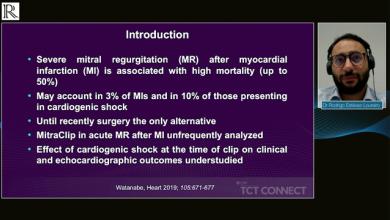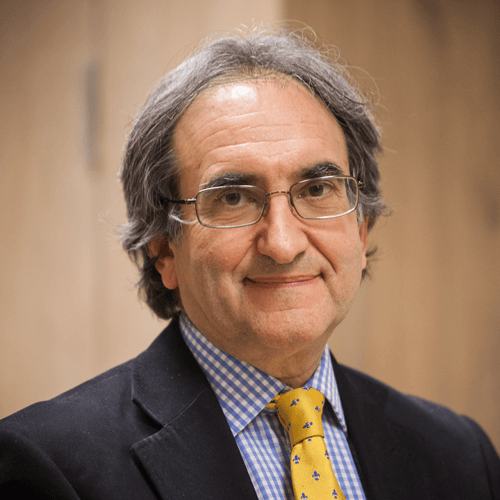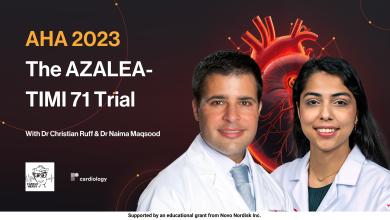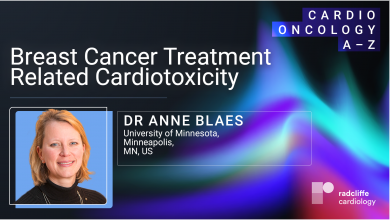Search results
Added:
3 years ago
Dr Rodrigo Estévez-Loureiro (University Hospital Alvaro Cunqueiro, Vigo, SP) discusses the outcomes of MitraClip in patients with acute mitral regurgitation in AMI with and without cardiogenic shock.
Questions
1. What is the background of the study?
2. How did you define cardiogenic shock?
3. What was the design, patient population and endpoints?
4. What were the key results?
5. What…
View more
Diana Gorog
Research Area(s) / Expertise:
Job title: Cardiologist and Clinical Lead for Non-cancer Research
Author
Juan Carlos Kaski
Job title: Professor of Cardiovascular Science
Author
Author(s):
Naima Maqsood
,
Christian Ruff
Added:
5 months ago
AHA 23 - Dr Naima Maqsood, CardioNerds ambassador (Temple University Hospital, US) interviews Dr Christian Ruff (Brigham and Women's Hospital, US) on the late-breaking findings from the AZALEA-TIMI 71 randomized trial (Anthos Theraputics, Inc).AZALEA-TIMI 71 aimed to evaluate the bleeding profile of abelacimab as compared to rivaroxaban in patients with atrial fibrillation who are at moderate to…
View more
Clinical Utility of Realtime Three-dimensional Echocardiography - A New and Emerging Standard
Author(s):
Tamar S Polonsky
,
Victor Mor-Avi
,
Roberto M Lang
Added:
3 years ago
Article
Author(s):
Peter J Fitzgerald
,
Martin B Leon
Added:
3 years ago
An unintended consequence of the market success of drug-eluting stents has been a growing concern about their safety and safety-related costs. These devices have been so quickly and widely adopted that their market penetration already equals that of some of the most popular pharmaceutical drugs. Consequently, the absolute significance of even a low incidence of side effects becomes magnified by…
View more
Author(s):
Rakesh Latchamsetty
Added:
3 years ago
Introduction
Premature ventricular complexes (PVCs) in the absence of underlying structural heart disease have long been viewed as benign. Early studies with small population sizes and limited cardiac testing suggested that long-term prognosis in patients with idiopathic PVCs is similar to those in patients without other cardiac disease, and treatment was consequently limited to provide…
View more
Added:
1 year ago
In this video we invited Dr Anne Blaes, Associate Professor in the Division of Hematology and Oncology at the University of Minnesota, to summarise the topic of breast cancer treatment related cardiotoxicity. Dr Blaes is an active medical oncologist with a special interest in the late effects of cancer therapy.
Discussion Points:
1. What are the main cancer treatments that cause this problem?
2…
View more
Author(s):
Barbara J Turner
,
Tara Lagu
Added:
3 years ago
Ischemic heart disease and stroke account for nearly 25% of all deaths worldwide.1 With an increasing array of effective medications for hypertension and hyperlipidemia, the toll exacted by vascular disease should diminish. However, control of these two primary causes of vascular disease has been seriously compromised by under-diagnosis and under-treatment.2,3 National survey data in the US has…
View more















 « First
« First